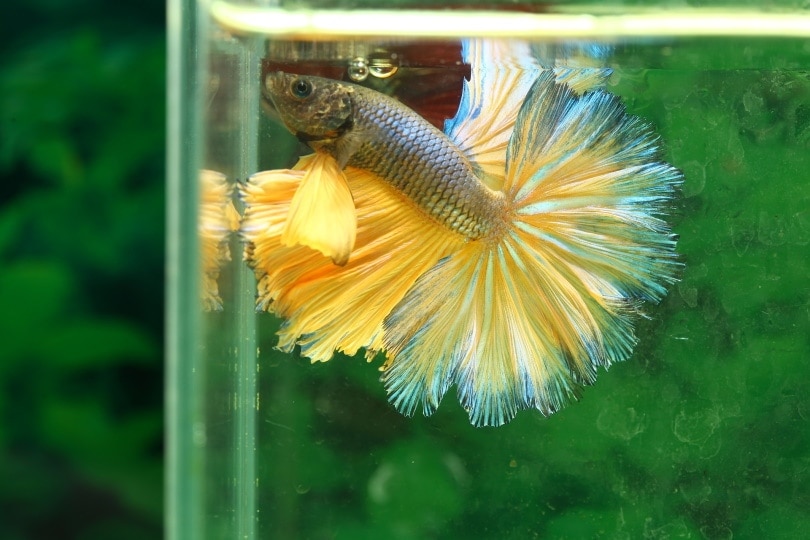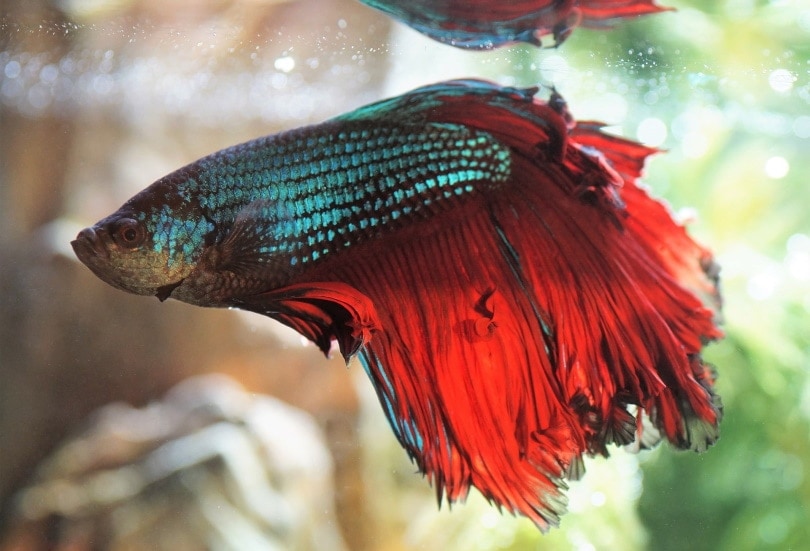Why Do Betta Fish Jump Out of Their Tanks? 5 Vet-Approved Reasons & Solutions

Updated on

If you own a Betta fish and were surprised to find that it has jumped out of the aquarium, the good news is that these fish are quite hardy, and as long as you caught it quickly, it should be ok. We recommend covering the aquarium immediately. However, there are many reasons why your Betta fish might be jumping out of the tank. Keep reading while we list as many reasons as possible for your fish’s behavior and what you might do to fix it to make sure your fish isn’t sick, and no water hazard could lead to other problems.
The 5 Reasons Your Beta Might Jump Out Of The Tank
1. Ammonia Build Up
Ammonia is toxic to fish, including your betta, and can permanently damage the gill structures and other soft parts of the fish, and some believe it can cause a burning sensation to the fish, which might be causing your Betta to attempt to jump out of the water. Other signs to look out for are lethargy, loss of appetite, gasping at the surface, inflamed eyes, and erratic swimming. Your Betta fish will likely try anything to escape the ammonia, including jumping out of the tank.

The primary product of a fish’s metabolism is ammonia. This means that most of the ammonia found in an aquarium is released by the fish as they breathe. The best way to prevent damage to your fish is to test your water frequently with a test strip or test kit so you can catch increasing levels before they get out of hand.
In our experience, not changing the water frequently enough is the most common cause of an ammonia spike in a tank that’s been running longer than 4 weeks, followed closely by allowing dead plants to remain in the tank too long. We recommend changing about 25% of the water in an aquarium at least once a week to keep ammonia levels in check. Doing a water change also helps you remove uneaten food, and also keeps the levels of nitrite and nitrates in change.
Many inexperienced owners add the fish immediately, which can cause a spike in ammonia as the waste breaks down. This ammonia spike causes many fish to die in the first few weeks.
To avoid this, it is best to perform a fishless cycle before adding your fish into an aquarium. There are several ways to go about this. The easiest way is to set up everything in an aquarium and add some store bought ammonia into the aquarium (this is available in most hardware stores). Allow the bacteria to slowly grow and colonize in your aquarium. Your aquarium should be ready for fish if when adding enough ammonia into the tank, it causes a 5 ppm (parts per million) spike that resolves itself in 12 hours (retesting the water in 12 hours should yield a 0 ppm reading). This process usually takes around 6-8 weeks.
2. Not Enough Space
Keeping a Betta fish is a popular trend, and it creates an attractive moving decoration. It’s possible because the Betta fish doesn’t use gills like most fish do and instead takes small gulps of air from the surface. Breathing air allows the fish to live in stagnant water with very little oxygen. However, just because the fish can survive in a small amount of water doesn’t mean it’s happy about it, and if your fish gets the desire to swim, it may try to leap out of the water.
House your Betta in a reasonable five or ten-gallon tank. This space will allow your fish much more room to swim, and we recommend plenty of vegetation your pet can use as hiding spaces.
3. Improper Lighting
Another reason your fish might try to jump out of the water is that the lighting is wrong. Keeping the lights on all the time can increase anxiety causing the urge to escape.

Your pet needs to have a regular day and night cycle where the lights are on or off at specified times each day. These day-night cycles allow your pet to get the rest it needs and will allow it to behave naturally. Some owners use a timer to make sure the lighting stays consistent.
Please be warned that you shouldn’t turn the lights on in an aquarium when the room is completely dark. Doing so can shock fish into death.
4. It’s Just Breathing
Obviously, this isn’t true if you found your fish on the floor, but many inexperienced owners see the Betta racing up to the surface repeatedly, and it could certainly look like your fish is getting ready for a big jump. However, as we mentioned earlier, Betta fish need to breathe air from the surface, and there is a good chance your fish is just getting a breath of fresh air and has no intentions of leaving its happy home.
5. Your Fish Thought It Was Feeding Time
Many times, Betta fish jump out of their water because they often associate a small gap on the lid as “places where food comes from” whenever they observe you feeding them. Therefore, if the lid is ever left unattended and open, they might think it’s meal time and might jump for food, landing out of the water.
Summary
If you see your Betta fish swimming to the top of the tank every few minutes, there is a good chance it’s just taking a breath, but if your fish darting around the tank like their tail is on fire for a prolonged period, it could be an ammonia spike. We recommend checking the water frequently and making adjustments before the ammonia levels get too high.
We hope you have enjoyed reading over this guide, and it has helped answer your questions. If you have learned something new, please share our look into why Betta fish jump out of their tanks on Facebook and Twitter.
Featured Image Credit: yin8003211, Pixabay












